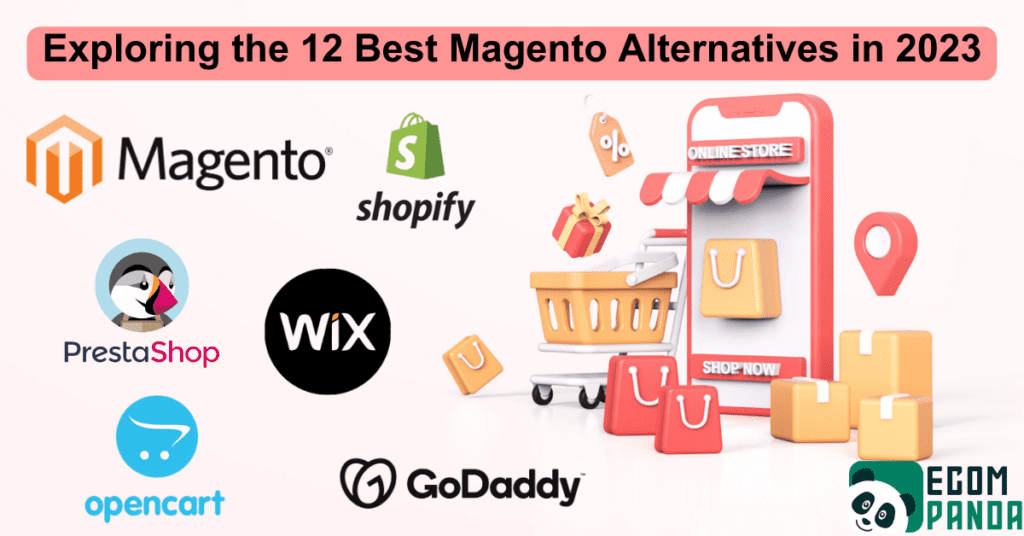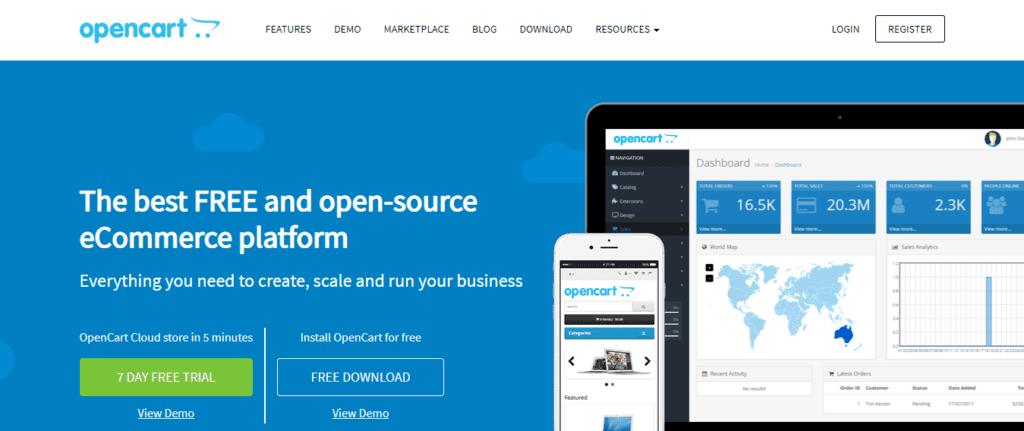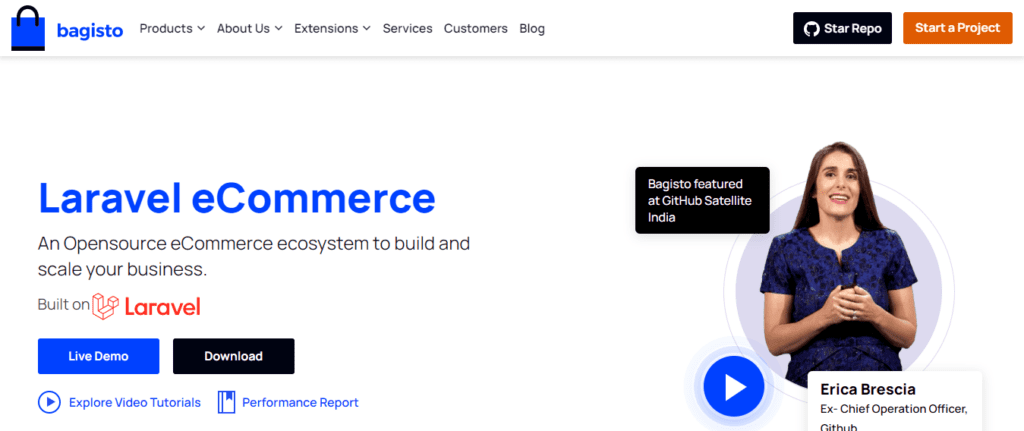Introduction
Magento, an open-source ecommerce platform, was launched in 2007 and has since enabled businesses to construct and manage online stores. In the modern digital marketplace, Magento continues to play a significant role.
As of 2023, Magento powers over 267,000 active ecommerce websites, with nearly 100,000 of these running on Magento 2. The platform is downloaded nearly 5,000 times every day and is used by over 19759 companies globally. The majority of Magento users are in the United States, followed by the United Kingdom and the Netherlands.
Magento’s features range from customizable shopping experiences to multi-website management and mobile commerce. Despite its wide-scale usage and capabilities, there are several reasons to consider Magento alternatives.

Table of Contents
Why Not Magento?
A few reasons why not Magento: It can be notably expensive for small businesses due to licensing and hosting fees. Magento is technically complex, necessitating expert knowledge for setup and management, which may not be readily available for all businesses. The platform can be slow, particularly under high traffic, which can negatively impact the user experience and, subsequently, the business. Magento’s history of security vulnerabilities is another concern, posing potential risks for businesses.
Furthermore, its community edition doesn’t provide official support, creating challenges for businesses that require assistance. Finally, Magento’s scalability limitations may deter businesses looking to quickly scale or handle high traffic volume.
Reasons to Consider Magento Alternatives
Magento has been a prominent player in the ecommerce platform landscape since its inception in 2007. Despite its widespread use, a growing number of businesses are considering Magento alternatives. Here are five key reasons why these businesses are looking to switch:
- Cost: Magento’s licensing and hosting fees can be steep, particularly for small businesses. The hefty price tag associated with maintaining and running Magento may be a deterrent, particularly for smaller businesses with tighter budgets.
- Complexity: The platform is intricate and often requires technical expertise to set up and manage effectively. Small businesses, in particular, may lack the in-house technical resources necessary to fully leverage the capabilities of Magento.
- Performance Issues: Magento can be slow, especially if a website experiences high traffic volumes. This sluggishness can lead to a poor user experience and impact conversions negatively.
- Security Concerns: With the end of life announcement for Magento 1, businesses may be at risk of security vulnerabilities as Magento has ceased developing and patching the technology. Magento has a history of security vulnerabilities which can be a potential liability for businesses.
- Lack of Support: The Magento Community Edition does not provide official support, which can pose a significant challenge for businesses requiring technical assistance. This lack of support can exacerbate the problems for businesses struggling with the complex nature of the platform.
These reasons reflect the pressing need for considering Magento alternatives. Magento alternatives are numerous and include both open-source and SaaS ecommerce platforms. These platforms provide a variety of benefits, from more user-friendly interfaces to better scalability options, and they are suited to businesses of different sizes and types.
Such Magento 2 alternatives include platforms like Shopware, WooCommerce, BigCommerce, Shopify, and OpenCart as well as SalesForce Commerce Cloud, PrestaShop, Volusion, and Drupal.
Therefore, while Magento has substantial capabilities, its complexity, potential security risks, and other challenges have led many businesses to consider Magento alternatives. The diverse range of Magento alternatives available offers a multitude of options to businesses, allowing them to choose a platform that best suits their individual needs and capabilities.
For example, Shopware is a flexible and comprehensive platform that offers strong B2B capabilities and is favored by many former Magento users. WooCommerce is a free and open-source platform built on WordPress, offering a user-friendly interface with many plugins and customizations. BigCommerce is a SaaS platform that provides robust features and scalability with an easy-to-use interface.
Shopify is one of the most popular platforms, known for its user-friendly setup and affordable pricing. Lastly, OpenCart is praised for its user-friendly interface, strong SEO features, and multi-currency and multi-language options.
No doubt, Magento remains a strong ecommerce platform, it may not be the best fit for all businesses. Businesses should consider these Magento alternatives based on their specific needs, budget, technical capabilities, and long-term growth plans.

Magento Alternatives: 12 Suitable Options to Consider
Evaluating Magento alternatives, it’s clear that each presents unique features and benefits catering to different business needs and technical capabilities. Some alternatives emphasize user-friendly platforms while others focus on limitless customization options. Shopify Plus and Salesforce Commerce for B2C are great choices for larger enterprises due to their scalability and comprehensive solutions.
Shopify and BigCommerce cater to small and medium-sized businesses providing them with complete, user-friendly ecommerce solutions. WooCommerce and PrestaShop are highly customizable and are often chosen by developers who want the freedom to tailor-make their online stores.
WooCommerce is particularly popular due to its seamless integration with WordPress Other noteworthy Magento alternatives are OpenCart, Volusion, and Drupal which cater to various business needs with distinct features.
The choice of Magento alternatives should be made based on your business’s unique requirements, resources, and technical skill levels.
Evaluating Magento alternatives, it’s clear that each presents unique features and benefits catering to different business needs and technical capabilities. Some alternatives emphasize user-friendly platforms while others focus on limitless customization options. Shopify Plus and Salesforce Commerce for B2C are great choices for larger enterprises due to their scalability and comprehensive solutions.
Shopify and BigCommerce cater to small and medium-sized businesses providing them with complete, user-friendly ecommerce solutions. WooCommerce and PrestaShop are highly customizable and are often chosen by developers who want the freedom to tailor-make their online stores.
WooCommerce is particularly popular due to its seamless integration with WordPress Other noteworthy Magento alternatives are OpenCart, Volusion, and Drupal which cater to various business needs with distinct features.
The choice of Magento alternatives should be made based on your business’s unique requirements, resources, and technical skill levels.
Shopify
When considering Magento alternatives for your online store, it’s essential to look at popular platforms as they offer a wide range of features that cater to different business requirements.
Shopify is a robust eCommerce platform that was built specifically to support online stores. Its salient features include:
- Strong scalability, perfect for growing online businesses.
- Excellent customer support for troubleshooting issues.
- Over 6,000 integrations for enhancing your online store.
- Extensive e-commerce features, like shipping, tax calculation, product variations, shopping cart functionality, return policies, and procedures.
- Strong reporting and sales analytics for data-driven decision-making.
- Built-in shipping, tax options, and a greater variety of payment gateways.
- Advanced fraud prevention measures and secure payment processing (PCI compliant).
Although there is a limited number of free templates, Shopify‘s templates are designed purely for selling online.

Wix eCommerce
Wix eCommerce is a highly user-friendly platform, ideal for beginners and small businesses. Some of the key features of Wix eCommerce include:
- User-friendly interface with drag-and-drop editor.
- Free plan available, and other plans are quite affordable.
- Offers over 800+ design templates and provides high levels of creative control.
- A comprehensive suite of built-in features and a large app market.
- Ability to sell physical, digital, and service products.
- Good SEO tools for better visibility in search engine results.
- Free SSL, Level 1 PCI DSS compliance, and additional built-in security measures.
- Although not initially designed to host online stores, it now allows eCommerce functionality with more product options and variations.
- Does not charge transaction fees.
In terms of Magento alternatives, both Shopify and Wix eCommerce stand strong with distinct advantages. Shopify proves its mettle in scalability and comprehensive e-commerce features, ideal for large online stores.
On the other hand, Wix eCommerce stands out for its user-friendly experience, affordability, and creative control, making it an excellent choice for small and emerging businesses.
When it comes to setting up an online store, selecting the right platform is of utmost importance. As you consider Magento alternatives, two possibilities worth exploring are GoDaddy eCommerce and OpenCart. Both offer unique features, with distinct pros and cons, which can cater to different needs and requirements for various businesses.

GoDaddy eCommerce
GoDaddy eCommerce is a closed-source solution hosted by the platform provider, which can simplify the setup and management of your online store.
Pros
- Relative simplicity compared to open-source platforms.
- You won’t need extensive coding skills or technical knowledge to set up your online store.
- It provides a variety of pre-designed themes to use out-of-the-box, which can help get your store up and running quickly.
Cons
- limited control over customizability While you can modify the themes, there are restrictions on what you can change, making it harder to implement a fully customized design.
- This limitation can affect businesses looking for a unique aesthetic or specific functionality in their online store.
Features
GoDaddy eCommerce comes with several features such as inventory management, payment method integrations, shopping cart, and checkout functionalities, among others. However, as a closed-source platform, the scope for customization and scaling can be restricted.

OpenCart
OpenCart is an open-source platform offering limitless customization, providing you have the necessary coding knowledge.
Features
OpenCart offers a range of features, including inventory management, shopping cart, and checkout options. Furthermore, you can enhance functionality with the help of extensions and plugins.
GoDaddy eCommerce and OpenCart offer differing experiences, each suited to different types of businesses. If you prefer ease-of-use and need a quicker setup with less customizability, GoDaddy eCommerce might be an ideal choice among Magento alternatives.
On the other hand, if you’re looking for flexibility, scalability, and customization and are willing to put in more technical effort, OpenCart might be a more suitable alternative.
Pros
- One of the primary benefits of OpenCart is its customizabilit.
- You can tailor the source code to suit your specific requirements, offering significant control over your store’s functionality.
- It is self-hosted, allowing you to choose your hosting provider, which could give you more flexibility as your store grows.
- OpenCart ensures scalability.
- Open-source platforms are well-suited to manage a high number of orders per minute and support an extensive range of SKUs.
Cons
- On the flip side, one of the cons of OpenCart is its demand for technical knowledge.
- To make full use of the platform’s potential, you need coding skills. It’s also your responsibility to manage maintenance, security, and hosting, which could be a challenge for businesses with limited technical resources.

BigCommerce
BigCommerce is a popular e-commerce platform known for its dedicated service to online stores, ranging from simple to sophisticated operations.
Features
This platform provides a wide range of customizable templates that help in designing and personalizing online stores. It’s particularly known for the ease of customization and the large number of standard features it offers, which includes seamless integration with online marketplaces and social media, which can save a lot of time for the users.
BigCommerce is a hosted e-commerce platform, which means users do not need to purchase web hosting or install anything on their devices to use it. All they need is a web browser and an internet connection.
Pros
- One of the significant benefits of BigCommerce is its excellent management tools ranging from order management to product management, thus enhancing your overall store management experience.
- The platform’s ease of customization and the large number of standard features it offers, including integration with online marketplaces and social media, is another significant advantage.
Cons
- Despite its numerous advantages, BigCommerce is not without flaws. Users may find the initial setup confusing, especially if they are new to e-commerce.
- Moreover, making changes to the site’s content can be a bit challenging as it may be hard to find various sections such as the header, footer, etc., to make the desired changes.

PrestaShop
PrestaShop is another leading e-commerce solution that offers a free and open-source platform for online store owners.
Features
First launched in 2007 in France, PrestaShop has become one of the world’s leading shopping cart solutions. The platform is not heavily reliant on plugins, so users can get their website going without having to purchase plugins.
The admin panel is also very user-friendly, providing customization ability and thus offering an ideal solution for setting up an e-commerce site. With PrestaShop, the source code is free; however, you may need to pay for web hosting and possibly several (often expensive) modules to integrate various functions into your site.
Remember, these Magento alternatives, i.e., BigCommerce and PrestaShop, are just two of many options available, so explore and evaluate your options thoroughly to ensure the best fit for your business.
Pros
- PrestaShop offers various benefits such as it being both easy and free to download, making it budget-friendly for new business owners.
- It is highly customizable, allowing the addition and deletion of features in a shopping site.
- PrestaShop supports various currencies and languages, with complete support available in English and French.
- It offers reliable, convenient, and secure payment options such as PayPal and Google Checkout.
- There are many modules and themes available in PrestaShop.
Cons
- The platform does have its drawbacks. For instance, PrestaShop’s designs are considered somewhat unprofessional, especially for large-scale stores, despite having all essential functionalities
- Many add-ons in PrestaShop can be prohibitively expensive. The platform requires at least basic website developer skills, and its scalability is limited, making it suitable only for small and medium-sized stores.
- While PrestaShop does not offer expert and support teams, it does have a strong support community founded by its active users.

Salesforce Commerce Cloud
Salesforce Commerce Cloud is a Software as a Service (SaaS) platform offering scalability, extensive features, and the ability to assist store owners in constructing and optimizing their online business. Born to serve a variety of eCommerce needs from small to large enterprises, it boasts a comprehensive suite of out-of-the-box features that cater to both B2C and B2B demands.
Features
Salesforce Commerce Cloud stands out for its robust merchandising functionality that allows quick storefront construction without any difficulties1. It offers an effective catalog management system and highly personalized and machine learning experience via Commerce Insights.
The platform is not only a part of the Salesforce 360 integrated CRM, but also allows you to manage multiple storefronts in a single place. It can accommodate hundreds of SKUs and huge order volumes, making it an excellent option for businesses with a wide array of products. Furthermore, the integrated Einstein AI in the platform can generate insights to drive revenues, repeat sales or hyper-personalized deals.
Pros
- One of the main advantages of Salesforce Commerce Cloud is its SaaS-based platform, which allows users to save time and money in business development as Salesforce manages all server upgrades and maintenance.
- Due to its cloud-based nature, it can instantly provide access to the latest software version, infrastructure improvements, and functionality. Its robust merchandising functionality and effective catalog management system are other significant advantages.
- Additionally, the platform offers a highly personalized and machine learning experience through Commerce Insights.
Cons
- Despite its various benefits, Salesforce Commerce Cloud does have some drawbacks.
- For B2B customers, it charges a $4.00 – $8.00 per order fee, which can add up if the business services a large community of buyers that place smaller orders.

WooCommerce
WooCommerce is a powerful eCommerce platform that serves as one of the most popular Magento alternatives.
Features
- Flexibility: As an open-source platform, WooCommerce is extremely flexible, allowing customization to cater to all types of businesses. It also supports unlimited products.
- Extensive Extension System: WooCommerce has a robust extension system. These extensions, based on the WordPress plugin format, allow for added functionality and personalization.
- Compatibility: It’s compatible with nearly all WordPress themes, offering a myriad of customization options.
- Basic Security: WooCommerce comes with basic security features to protect your online store.
WooCommerce is an accessible and flexible platform that caters to a wide range of online business needs. It has emerged as one of the Magento alternatives that offer a cost-effective solution for setting up an online store.
However, potential users must be aware that additional costs might incur from premium themes and extensions, and they should be cautious to avoid common errors due to the platform’s ease of use. As Magento alternatives, WooCommerce and Salesforce Commerce Cloud are powerful and feature-rich platforms for eCommerce businesses. They each come with their unique strengths and weaknesses.
Pros
- Setting up a WooCommerce store is free, aside from web hosting expenses.
- WooCommerce, as one of the popular Magento alternatives, is remarkably easy to use, especially if you have any experience with WordPress. The setup speed and user-friendly nature of the platform is another key advantage.
- A huge community has been formed around WooCommerce, providing endless resources for store owners. This means countless articles, videos, tutorials, and more to help you through your journey.
Cons
- If you’re not already using WordPress, you’ll need to learn two new platforms.
- While the platform itself is free, the costs for premium themes and extensions can add up quickly.
- Being user-friendly and easy to use means there’s also room for more human error. This isn’t a flaw in the software but something users should be aware of.

Volusion
Features
Volusion is a cloud-based eCommerce platform providing a comprehensive solution for online businesses. While considering Magento alternatives, Volusion emerges as a viable choice due to its versatility and user-friendly nature. Unlike open-source platforms, Volusion eliminates the need for extensive manual implementation of updates and patches.
Volusion provides key features such as PCI compliance, web hosting, security protocols, and QA for additional apps including ESP, CRM, CMS, ERP, analytics, and BI tools. The platform also offers development options for new tools like discount and promotion engines, merchandising and marketing tools, and drag-and-drop builders for designing.
Despite these comprehensive features, the platform might be perceived as burdensome for some brands due to the requirement of technical knowledge and the possible high cost of maintenance.
Pros
- Volusion, being a cloud-based platform, provides hosting solutions that are managed off-site, freeing users from the responsibilities of self-hosting.
- The platform enables businesses to centralize their operations and run their business their way.
It offers extensive ecommerce features and also integrates with common business tools.
Cons
- The platform might require considerable technical knowledge for proper utilization.
- Costs can be deceiving as, unlike SaaS platforms, open-source solutions like Volusion often leave security, licensing fees, and maintenance responsibilities to the user.
Bandwidth allowances are specific and not unlimited like in SaaS solutions.

Drupal
Features
Drupal stands among the best eCommerce CMS options and can be considered as a worthy Magento alternative. It is a highly adaptable open-source CMS, allowing full control over customization, hosting, and functionality.
Drupal provides users with an array of robust features, including robust SEO tools for content and URL optimization. This feature aids businesses in ranking better and attracts targeted audiences, therefore improving click-through rates (CTR).
Pros
- As an open-source CMS, Drupal is accessible to everyone globally, inviting contributions from all over the world.
- It allows users to have complete control over their websites and ecommerce stores regarding customizations, hosting, and functionality.
Drupal offers comprehensive SEO tools which assist in aligning the online store with search engine requirements, ultimately helping in ranking better.
Cons
- Due to its open-source nature, users are responsible for PCI compliance, web hosting, and security issues.
- Maintenance and security can be expensive since users have to manage these aspects on their own.
The platform might require technical knowledge, which can be a challenge for users lacking such expertise.

Bagisto
Bagisto is a hand-tailored eCommerce framework designed using some of the latest open-source technologies such as Laravel, a PHP framework, and Vue.js, a progressive Javascript framework.
This open-source eCommerce framework is an excellent alternative for those looking for Magento alternatives. The typical users of Bagisto are freelancers, large enterprises, mid-size businesses, non-profits, public administrations, and small businesses.
Features
- Multi-Warehouse Inventory Management: Bagisto offers a robust inventory management system that can handle multiple warehouses.
- Payment Gateway Integration: The platform integrates with popular payment gateways like PayPal by default and offers various extensions for transaction processes, such as Stripe, Authorize, CashU, Instamojo, and Razorpay.
- Multiple Website Storefront: Bagisto allows for the easy configuration of multiple website storefronts with a common admin panel.
- Open-source PWA: Bagisto includes an open-source PWA to provide native mobile app-like functionality.
- Dashboard: Bagisto provides a dashboard to help track current statistics of sales and revenue.
- Integration: Bagisto integrates with applications such as authorize.net, Razorpay, Pi., PayPal, Sendcloud, WhatsApp, PayU, Stripe, Braintree.
- Multi-Currency: Bagisto supports multiple currencies, offering a more comprehensive eCommerce experience.
Pros
- Bagisto is a cost-effective solution, especially for startups and small businesses looking for Magento alternatives. It is a free, open-source platform that offers a range of features.
- It has a good user interface and numerous free features.
- Bagisto is praised for its performance, security, and functionalities.
- The software allows customization, making it highly beneficial for IT background developers.
- Bagisto consumes less server resources, making it an efficient solution for eCommerce businesses.
Cons
- New users might find the installation of new modules a bit tricky.
- Some users reported that the documentation and information about creating proper Packages/Module/Theme are lacking.
- The Vue.js integration is not optimal, and there are some issues with the basic UI/UX.

OroCommerce
OroCommerce is a robust open-source B2B eCommerce platform that comes with a plethora of features to launch and run a full 360-degree business with minimal customization. As one of the Magento alternatives, it is gaining popularity due to its focus on B2B operations and seamless integrations with other marketing tools.
Features
OroCommerce is purely B2B focused and comes with a flexible B2B workflow and role structure. It integrates seamlessly with OROCRM and other marketing tools like DotMailer, providing a comprehensive solution for businesses. It also offers robust admin management, which allows for efficient handling of various business operations.
Pros
- The major advantage of OroCommerce is its focus on B2B operations.
- Unlike many other platforms, it is designed specifically for B2B transactions, making it a suitable choice for businesses operating in this domain.
- It also comes with out-of-the-box integrations with OROCRM and other marketing tools, which can enhance the functionality of your eCommerce operations.
Cons
- Despite its many advantages, OroCommerce has a few drawbacks.
- It has a limited extension marketplace, which may restrict the customization options for businesses.
- Additionally, compared to Magento, OroCommerce needs to improve in terms of development availability and support. However, as the B2B market grows, it is expected that these areas will improve.

Which Magento Alternative is Suitable for You?
Choosing a suitable Magento Commerce alternative depends on several factors, including your business’s size, budget, technical expertise, and specific needs. While Magento has an impressive range of features, its costliness, high maintenance, slower speed, and lengthy development time have led many to seek Magento alternatives.
Magento is a popular choice for medium to large scale businesses due to its customizable nature, hassle-free scalability, and code-level access. However, it can be daunting for newcomers or businesses with limited budgets.
For those venturing into the eCommerce space for the first time, it may be better to start with one of the Magento alternatives that offer similar features but are less demanding in terms of cost and technical expertise.
Open-source alternatives to Magento, such as OpenCart, WooCommerce, Zen Cart, and PrestaShop, provide code-level access to your web store, similar to Magento. For instance, OpenCart has many similarities with Magento, including being developed in PHP and using templates for product uploads. It supports multi-currency and multi-language and offers thousands of plugins for store personalization.
For those who find Magento’s maintenance and development time-consuming and complex, alternatives like BigCommerce, Shopify, Wix eCommerce, and Squarespace Commerce might be a good fit.
These platforms are easier to use and maintain, and they typically require less development time. These Magento alternatives also come at a more affordable price, making them more accessible to businesses with tighter budgets.
So, which Magento alternative is suitable for you? It ultimately depends on your specific needs, budget, and technical expertise. If you are a large enterprise with a generous budget and a team of skilled developers, Magento could be the right choice. But if you’re a startup or small business, one of the mentioned Magento alternatives could provide a more affordable and less complex solution to your eCommerce needs.
Conclusion
Magento has proven to be a significant player in the e-commerce market, boasting a plethora of high-level features, its customizable nature, and code-level access. However, it isn’t a universal solution for all businesses, and certain drawbacks like its cost, slow speed, longer development time, and difficulty in maintenance may lead businesses, especially those just starting, to seek Magento alternatives.
Magento Alternatives: A Broad Spectrum
There are numerous alternatives to Magento in the market today that cater to a wide array of business needs, thus providing an opportunity for business owners to choose what best suits them.
Comprehensive Solutions
- BigCommerce: This platform is optimized for quick response, and its partner ecosystem is designed to help businesses innovate and succeed without limits.
- Shopify Plus: Shopify Plus, a user-friendly and scalable enterprise e-commerce platform is suitable for high volume merchants generating over $1 million in annual revenue.
- Salesforce Commerce for B2C: It combines the functionality, flexibility, and customization capabilities of an in-house application with the operational benefits of the on-demand model.
- SAP Commerce Cloud: This provides a complete omnichannel digital commerce platform with industry-specific capabilities and pre-built integrations.
- 2Checkout (now Verifone): This alternative powers modern Digital Commerce, solving the complexity of online commerce, subscription billing, and global payments for Software, SaaS, and Online Services companies.
For Small and Medium Businesses
- Shopify: This is a cloud-based commerce platform designed for small and medium-sized businesses. Merchants can use it to design, set up and manage their stores across multiple sales channels.
- WooCommerce: This popular WordPress eCommerce plugin is free and full of features, which can be perfectly integrated into a self-hosted WordPress website.
- PrestaShop: An open-source e-commerce solution, it powers more than 300,000 online stores worldwide.
Open-source Alternatives
- OpenCart: Similar to Magento, OpenCart is an open-source platform developed in PHP. It supports multi-currency and multi-language and offers a lot of templates.
In conclusion, the decision on which platform to choose ultimately depends on your unique business requirements, budget, technical capacity, and vision for your store. Regardless of the Magento alternative chosen, what is important is that it aligns with your business goals and is capable of scaling with your growth.
Frequently Asked Questions
What is better than Magento?
Some alternatives that are considered better than Magento include Shopware, WooCommerce, BigCommerce, Shopify, and OpenCart. These platforms often provide user-friendly interfaces, customization options, and better scalability, which might make them preferable over Magento.
Who are competitors to Magento?
The competitors to Magento include Shopware, WooCommerce, BigCommerce, Shopify, OpenCart, SalesForce Commerce Cloud, PrestaShop, Volusion, and Drupal. These alternatives offer various features to facilitate the setup of different kinds and sizes of ecommerce stores.
Is Magento still relevant?
Yes, Magento remains relevant as it continues to power a significant number of ecommerce sites. However, with its complexity, high cost, and the need for technical expertise, many businesses are considering Magento alternatives for better suitability.
Why is Magento so expensive?
Magento can be expensive due to its licensing and hosting fees. It requires technical expertise to set up and manage, which can contribute to higher operational costs. Additionally, official support is not provided for Magento's community edition, which may necessitate additional expenditure for businesses needing assistance.







